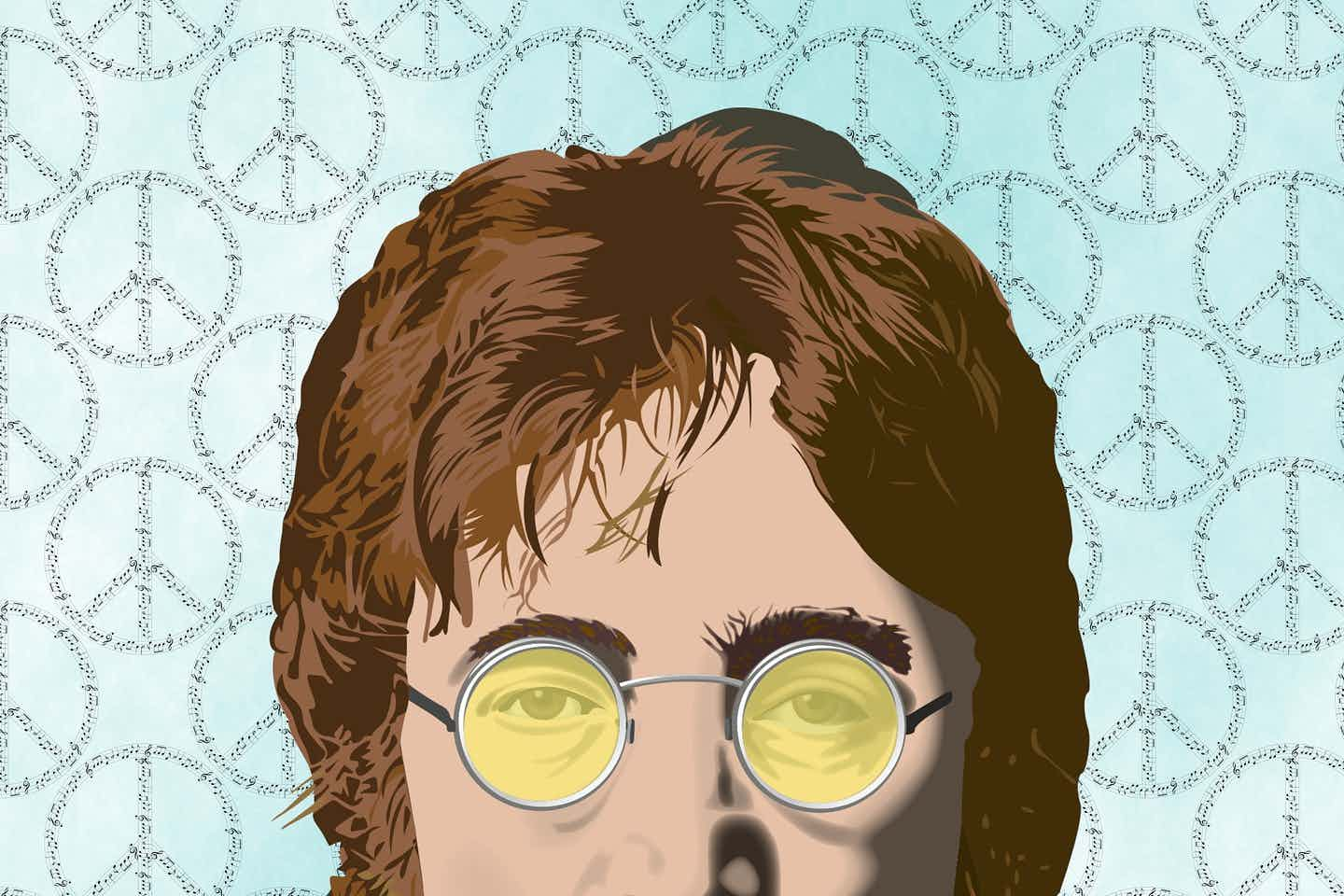Today we praise diversity and inclusivity, but it is worth noting that fifty years ago, the charts contained Amazing Grace by The Pipes and Drums and Military Band of the Royal Scots Guards. Heart of Gold by Neil Young, Telegram Sam by T-Rex, American Pie by Don Mclean, Stir it Up by Johnny Nash, and Blue is the Colour by Chelsea Football Team. I'm not suggesting that this signifies equality, only open-mindedness, and to quote 70s legend Frank Zappa "A mind is like a parachute. It doesn't work if it is not open."
1. Tiny Dancer - Elton John (1972)
In my opinion, Tiny Dancer is one of Elton John's best tunes and some of Bernie Taupin's loveliest lyrics. It is an unusual song as it keeps you waiting around for over two minutes until the chorus kicks in, but when the build-up is finally resolved (used to beautiful effect in the movie Almost Famous), it's worth the wait. Tiny Dancer comes from Elton John's third album - Madman Across the Water, and despite being one of Elton's most popular songs, it was never released as a single in the UK, perhaps because of its 6:12 running time. It fared better in the US, where it got to number 41.
2. My Sweet Lord - George Harrison (1970)
When The Beatles split, George Harrison had a pile of songs, none of which had found their way onto an album. Consequently, he released All Things Must Pass as a triple album. It featured a new sound - still Ringo on drums but with slide and pedal-steel guitar and co-producer Phil Spector's wall of sound. Although he found himself in legal hot water to the tune of $587,000 after being found to have subconsciously plagiarised the Ronnie Mack song "He's So Fine", Harrison had a big hit on his hands when the song stayed at number 1 in the British charts for seven weeks in January 1971.
3. Let's Get It On - Marvin Gaye (1973)
Let's Get It On is, as Gaye described it, a plea for sexual liberation; for those of us who aren't so high-minded, it is an entreaty to have sex. Gaye was always the maverick in the Motown stable and more political than artists such as The Temptations or Diana Ross. As soon as those guitar wah-wah notes start, you know that some seriously hot music is coming up. A brilliant vocal performance from Gaye and his Band (The Funk Brothers - could they have had a better name?) are all over it too. In 2016 an artist who could hardly be less like Marvin Gaye, Ed Sheeran, was sued for plagiarism on his song Thinking Out Loud. The case was dismissed.
4. I Feel Love - Donna Summer (1977)
I Feel Love is another watershed moment in pop history. Until this song, the synthesiser was firmly in the hands of the prog rockers and avant-gardists, but Donna Summer and Giorgio Moroder grabbed it, turned it into a machine for pumping out hypnotic dance music, and Ibiza hasn't been the same since. The song was recorded for a concept album in which each song evoked the music of a different decade. I Feel Love was the mood for the future. Bowie, Brian Eno, The Human League, and Blondie are just a few of the artists whose music it has affected, leading to the Financial Times calling it "one of the most influential records ever made".
5. Imagine - John Lennon (1971)
John Lennon's (although shortly before his death, John said that much of the content for the song came from Yoko) plea for a peaceful, non-materialistic, secular world. Inevitably ranked in 'Songs of the Century complications, Imagine is Lennon's most played song. It has been covered by numerous artists and played on numerous public occasions- the New Year's Eve ball drop-in Time Square, the Tsunami Aid concert, and the 1996 and 2012 summer and 2006 winter Olympics. It reached number 1 after his murder in 1980. When released in the US as a single in 1971, it reached number 3, but it had to wait another four years before it would be released and reach number 6 in the UK. It is estimated that more than 200 artists have covered the song.
6. Maggie May - Rod Stewart (1971)
In the era of the singer-songwriter, Rod Stewart managed to juggle two successful careers, one as the lead singer of good-time rockers, The Faces and the other solo as a troubadour folkie. Maggie May encapsulates the Rod Stewart stage persona beautifully- a younger man in s sexual relationship with an older woman. He's contradictory and sensitive "I feel I'm being used", but streetwise ", I'll steal my daddy's cue and make a living playing pool". Without a doubt, though, Maggie May is still one of Rod Stewart's most popular songs (even though originally it was released as a B-side), spending five weeks a number 1 on the British singles charts and six weeks on top in the US.
7. Superstition - Stevie Wonder (1972)
Superstition came about as a result of what seemed an unlikely collaboration between Stevie Wonder and Jeff Beck. Beck had agreed to play the guitar on the Talking Book sessions in return for Wonder giving him a song that he could use on his forthcoming album. As the two experimented in the studio, Beck came up with the rhythm and chord progression on which Wonder improvised a riff. A few hours later, one of the soon-to-be most recognisable songs was in demo form. Due to delays on Beck's album, Wonder released the version that has become a classic.
8. Bohemian Rhapsody - Queen (1975)
Freddie Mercury had originally planned three songs, but before he had finished any of them, they became one and the unlikeliest hit of 1976. Because Bohemian Rhapsody has been with us for so long and is so familiar, it may seem strange to call it an "unlikely hit," but at nearly six minutes long and comprising five sections, including an operatic passage, it was not obvious radio material. Even by 1970's standards Bohemian Rhapsody is epic; some might even say 'overblown', but it worked. Paired with a new promotional tool - a video - it was able to be shown on TV, compensating for the difficulties of performing the song live. The impact of Bohemian Rhapsody on music is enormous, and it is as relevant today, having had over 1 billion streams (and counting) streams on Spotify.
9. American Pie - Don Mclean (1971)
Apart from the killer sing-along chorus that everyone knows, American Pie spent 50 years as the longest song to get to number 1 (Taylor Swift broke the record with All Too Well in 2021). The song is a journey through the Americana of 1959- the "day the music died"- when Buddy Holly, Ricky Valens, and The Big Bopper were killed in a plane crash, through to 1971, when the song was released. On the way, it chronicles American culture, social upheavals of the time, and a sense of loss and disillusionment as the US went from its 'golden age' to Vietnam. The song's symbolism brings together American teen culture and history, containing references from prom night to the Cuban Missile Crisis, Elvis, The Stones, The Beatles, Dylan, Elvis, and Janis Joplin.
10. Band on the Run - Paul McCartney & Wings (1974)
Paul McCartney's first solo album was a homemade effort that was considered okay. The second, Ram, seemed a little odd at the time but has aged well and is highly thought of today. But the third, Band on the Run, saw Macca back in form. It was an immediate success and rates as one of his and one of the decade's best albums. The single of the same name is one of those classic McCartney medleys- in three parts, it moves from a folksy introduction through a rocking middle and reaches a funky ending. It is supposedly inspired by the legal wrangles the Beatles were having at the beginning of the decade and their wish to escape from them. Since its release, it has been reissued three times with additional tracks and outtakes.
11. Midnight Train to Georgia - Gladys Knight and the Pips (1973)
The development of Midnight Train involves a who's who of celebs and musicians. It was originally recorded as Midnight Plane to Houston by Lee Major's friend Jim Weatherly who had, after a telephone conversation with Farrah Fawcett about her travel plans, liked the phrase and written a song based on it. Later, Cissy Houston (Whitney's mum) decided to record it but wanted to change the title. After doing this, her friend, Gladys Knight, decided to record the song but added brass and the call and response part from the pips. For me, this is what makes the song stand out, and although it's a bit cheesy, it works wonderfully and turns a good song into a great one.
12. Don't Stop Till You Get Enough - Michael Jackson (1979)
It's been reported that Michael Jackson's mum was angry when she heard the title of the song, thinking that its meaning was sexual. Michael reassured her that it was about "whatever you want it to be about," and he was set up for his first US solo single (although he was still officially in The Jackson 5) since Ben, seven years earlier. The single was taken from Jackson's Off the Wall album and produced by Quincy Jones (Jones would later produce Thriller, the bestselling album ever). Disco-style music had started to fade, but dance music was still big. 'Don't Stop…' works as an upbeat pop song and as a club favourite that still fills dance floors today.
13. Stairway to Heaven - Led Zeppelin (1971)
A song that is so well-known that it's referred to as the 'forbidden riff' and banned from guitar stores worldwide. It is in the family of three-part songs, with each section increasing in volume and tempo- from a soft acoustic opening through a slow middle section on electric instruments and finishing with hard rock. When the Band premiered the song live in 1971, it was not a success and bassist John Paul Jones is quoted as saying the audience was 'bored to tears. By 1975 Stairway to Heaven had become a highlight of Zeppelin's live act, and on stage, it was extended from the album's 7:55 to 15 minutes, including a 7-minute guitar solo. The song is frequently cited as one of the greats and will show up in most rock 'best of' lists. On its 20th anniversary, American radio sources estimated that it had had 2,874,000 radio plays in the US, and when a radio station in Florida started with a format playing Led Zeppelin-only music, they opened by playing Stairway to Heaven continuously for the first 24 hours.
14. You're So Vain - Carly Simon (1972)
In case there is still any doubt, Carly has admitted that the first verse was written about Warren Beaty, but after that, she keeps quiet. There had been speculation for many years, and the names of Mick Jaggar (who called into the recording session and sings background vocals), David Bowie, David Cassidy, and Cat Stevens have all been put forward as potential candidates. The intro is immediately recognisable, with The Beatles' old 'mucker' Klaus Voormann playing the distinctive bassline. You're So Vain was released in December 1972 and reached number 3 on the UK charts (it was re-released in 1991 to cash in on its popularity in a tyre ad) and got to number 1 in the US, Canada, Australia, and New Zealand charts. It is one of 37 songs that, according to lyrics.com, contains the word 'gavotte'.
15. Stayin' Alive - The Bee Gees (1977)
Thank goodness for disco. The first half of the decade had been dominated by the navel-gazing indulgence of prog; punk exploded, and we became angry nihilists. Then disco strutted onto the scene, and we finally could start enjoying ourselves. After some success in the late 60s, the Bee Gees decided to turn to disco in 1975 and released Jive Talkin. Two years later, Robert Stigwood, the Band's manager and executive producer of the Saturday Night Fever soundtrack, asked the Band to contribute some songs. Staying Alive was originally going to be called 'Saturday Night' to tie in with the title of the film, but the Bee Gees thought that there were already enough songs around with 'Saturday' in the title. They pushed for something darker that reflected the fight for survival on the streets of New York. Since then, when the irrepressible opening bars start, thousands of 'disco dads' unbutton shirts to the mid-drift, put a hand on their hip, point a finger skyward and for 3 minutes become John Travolta.
16. Heart of Glass - Blondie (1979)
In an interview in 1978 (Heart of Glass was a track on the classic 1978 Parallel Lines album and released in 1979 as a single), Debbie Harry expressed a love of Euro disco, especially the music of Giorgio Moroder and Kraftwerk. The influence of Moroder's I Feel Love is clear in Heart of Glass as it has a similar pulsating sequencer that drives the rhythm the entire length of the song. In 1978 there was little convergence between rock, punk, and dance music- if you liked Led Zeppelin or The Clash, it was unlikely that you'd spend Saturday night strutting your stuff in a club. Heart of Glass brought them together and helped different musical styles crossover.
17. Go Your Own Way - Fleetwood Mac (1976)
Rumours were, for the most part, written after the Band had rented a house and set about recording an album. Those sessions became legendary, not just because of the gargantuan drug consumption but also because of the candid way they chronicled the convoluted breakdown in the Band's romantic relationships. Go Your Own Way is Lindsey Buckingham's f*** you! to his ex of six years - Stevie Nicks. Unsurprisingly, the song did nothing to smooth things over. Nicks is especially unhappy about the line, "Packing up, shacking up. That's all you want to do" and said of Buckingham, "Every time those words would come onstage, I wanted to go over and kill him".
18. Dancing Queen - ABBA (1976)
A sure dance floor filler and karaoke favourite. Fourth in a Channel 4 poll of the Greatest Number One Singles, and a number one hit in 14 countries, including the UK, Australia, Sweden, South Africa, and the US. Waterloo had been their breakout, but it was Dancing Queen that cemented ABBA's position as one of the world's top acts. The song was written in response to the dance boom and replicated the 'wall of sound' production popularised by Phil Spector. George McCrae's 'Rock Your Baby' inspired Andersson and Ulvaeus to create a disco-style song that shifted between slow, thoughtful passages and a soaring chorus.
19. Life on Mars? - David Bowie 1973
The song is not about Mars but rather about a young woman going to the cinema to escape reality. The question, "Is there life on Mars?" implies that there is certainly not much on Earth. The song was a response to the media clamour over the US/USSR rivalry to get a land a spacecraft on the planet, and Bowie attempted to write another "My Way". The song was featured on Bowie's 1971 album Hunky Dory and released as a single two years later at the height of his Ziggy Stardust fame. It reached number 3 in the UK charts in 1973, and after Bowie's death in 2016, it got to number 7 on the US Billboard chart. As well as being an all-time classic, Life on Mars was the first pop song to get in reference to the Norfolk Broads.
20. It's Too Late - Carole King (1971)
Carole King had been a phenomenally successful songwriter during the 1960s and, in 1970, began collaborating on projects with Joni Mitchell and James Taylor. It was as the writer of the James Taylor bestseller 'You've Got a Friend,' also featured on her second album, Tapestry, that she became noticed as a 70s solo artist. What makes the song exceptional is the way it covers the breakup of a relationship. The resigned acceptance of the situation makes It's Too Late more adult than many earlier breakup songs. King wrote the music, and the lyrics were written in a single day by Toni Stern following the end of her relationship with James Taylor.
21. Virginia Plain - Roxy Music (1972)
Because of their look, Roxy Music sometimes gets pushed into the category of 'glam rockers' along with T-Rex, Sweet and (dare I write his name) Gary Glitter. As a consequence, their influence is often overlooked. When Virginia Plain was released, it was something unique. The song was a fusion of the 1950s and futuristic electropop. Virginia Plain sounded as if it were born from a night of passion between Elvis and Kraftwerk and featured Bryan Ferry, the coolest lounge lizard ever to don a tux, warbling the lyrics. There had been nothing quite like it before.
22. Let It Be - The Beatles (1970)
The Beatles' last hit single before Paul McCartney announced that he was leaving the Band in April 1970 (John Lennon had privately left in September the previous year). There are several versions of Let it Be; the single version with a quieter guitar solo, the album version where the guitar solo is more raucous, and a version from Let it Be...Naked, which was remastered in 2003. On its release, the single was described as having a 'quasi-religious' quality, and it still generates reverence when Paul McCartney plays it today. Let It Be, was one of the closing songs in the Live Aid concert. It was sung at Linda MacCartney's memorial service. It closed the 2001 Concert for New York City after the 9/11 attacks and was part of Paul McCartney's set in the 2012 Diamond Jubilee celebrations. Let It Be, has received both acclaim and criticism. John Lennon is famously said not to like it, while Rolling Stone ranked the song at number 20 on its 500 Greatest Songs of All Time list.
23. Bridge Over Troubled Water - Simon and Garfunkel (1970)
Another 'quasi-religious' offering from one of the bestselling albums of all time, Bridge Over Troubled Water, just squeaks in as it was one of the first releases of 1970. This is a 'big' song in terms of length (4:55) and arrangement and is far removed from the folkie ballads the duo had been doing previously. Bridge Over Troubled Water seemed to stick around in the charts forever and, during its lifetime, has been covered by over 50 artists. Like, Let It Be, with which it has many other similarities, which gets wheeled out on big occasions where some gravitas is called for. It was recorded in Cantonese and performed by various Hong Kong artists to raise money for the Eastern China flood of 1991 and again in the UK in 2017 to raise money for the families of victims of Grenfell Tower. Despite the album's success, Simon and Garfunkel went their separate ways (excluding a few reunions) later that year.
24. Rhinestone Cowboy - Glen Campbell (1975)
Paul McCartney rates Glen Campbell as one of the best guitar players he has heard. The fact that his virtuosity was not known much beyond the artists and other session musicians he worked with is a testament to Glen's singing. He had had a big hit with the Jimmy Webb composition, Galveston seven years earlier and had been a well know singing artist since 1967, but it was Rhinestone Cowboy that pushed him into the 'A-list'. Rhinestone Cowboy was Campbell's biggest-selling single getting to number 1 in the US and 4 in the UK. It became the inspiration for a film (Rhinestone, starring Dolly Parton and Sylvester Stallone) and was covered by British duo Rikki and Daz in 2002, with Campbell singing and appearing in the video.
25. Hotel California - Eagles (1977)
Since its release, the lyrics of Hotel California have been the subject of a host of speculation on their meaning. Some suggestions have been US religious cults, cannabis, alcoholism, heroin addiction, an allegory for 1970s hedonism, corporate greed, and even cannibalism. In 2013 co-writer Don Henley said that the song was about "a journey from innocence to experience ... that's all". The single has an instantly recognisable eight-bar intro, and its chord progression (Eagles' is in B minor- I-V-VII-IV-VI-III-IV-V) and Mexican Reggae tempo makes it unusual. Although Ian Anderson of Jethro Tull has commented (light-heartedly) that it is the same chord sequence as their 1969 song, We Used to Know.
26. Brown Sugar - The Rolling Stones (1971)
Brown Sugar was mostly written by Mick Jagger, who took inspiration from his then-girlfriend singer Marsha Hunt (although singer Claudia Lennear has claimed that it was about her). It was the opening track of the Band's Sticky Fingers and is considered by many to be the best song on the album. The song made its live debut at the infamous concert (where a fan was murdered by Hell's Angles acting as the Band's security) at the Altamont Speedway. Whatever you think about the Stones, they come up with some tremendous guitar riffs, and Brown Sugar is no exception. Rolling Stone magazine ranked it at number 5 on their list of the 100 Greatest Guitar Songs of All Time.
27. Paradise by the Dashboard Light - Meatloaf (1978)
Called the "Greatest rock duet of all time" (no doubt by writer Jim Steinman who was never overly troubled by modesty) and coming in at a weighty 8:28 for the album version, the karaoke microphone monopoliser's favourite. Paradise by the Dashboard Light is the story of a couple looking back on a high-school date. The young man is desperate to "go all the way tonight", and the young woman needs him to tell her that he'll "love her till the end of time.' Finally, there arethe recriminations. When I first saw it performed live on the normally reverential Old Grey Whistle Test (that is the version in the link), I couldn't believe my eyes. Meat Loaf and Karla DeVito (Ellen Foley sings on the recorded version) horrify and delight and leave you worn out. So good it was repeated the next week and, in the show's 'best-of' edition.
28. Mama Told Me (Not To Come) - Three Dog Night (1970)
This song has quite a pedigree. Written by Randy Newman (who at the time was emerging as a major songwriting talent and today writes some of the best-known movie songs) for The Animals' Eric Burdon and covered in 2000 by Tom Jones and The Stereophonics, Three Dog Night's 70s version went to number 1 in the US Billboard Hot 100 and reached number 3 in the UK. The song is a wry take, based on Newman's experience, of a wide-eyed young man's shock at the cannabis-smoking, whiskey-drinking, 'wild' party' he's at and how his mama had "told (him) not to come". Its catchy chorus and wry humour made the song a big hit on both sides of the pond. Despite numerous lineups and personnel changes, the Band are still going, and doubtlessly, this remains a highlight at their gigs.
29. Le Freak - Chic (1978)
Nile Rogers and Bernard Edward had originally written the lyrics in the chorus as F*** Off rather than Freak Out after being refused entry to the 1977 New Year's Eve party at Studio 54 (this was what the doorman had said as he slammed the door in their faces). Realising that this wasn't going to get any radio play, Rogers changed it to Freak Off and then Freak Out. This proved to be a good move, as the has single got to number 1 three times in the US and was selected for preservation in the National Recording Registry by the US Library of Congress as being "culturally, historically, or artistically significant." Whenever there is a film set in the 70s that needs some iconic disco music, Le Freak by Chic will be playing.
30. Lean on Me - Bill Withers (1972)
There is a sub-genre of 'I'll be there for you' songs"- You've Got a Friend, Time After Time, and I'll Be There For You are a few examples. Lean on Me is a classic of its type and one of only nine songs to have reached number 1 in the US, with versions by two different artists (Club Nouveau had a hit with it in 1987). The inspiration for the song came after Withers had moved to LA and found he missed the poor, close-knit community from which he had come. Lean on Me is an obvious choice whenever the musical equivalent of a group hug is needed and has appeared at occasions as diverse as the 2009 Barak Obama Inauguration Ceremony and, more flippantly, in the ending scene of the Simpson's episode "Radioactive Man".
31. The Model - Kraftwerk (1978)
While Giorgio Moroder and Donna Summer were laying the foundations of electronic music via the dancefloor, Kraftwerk were approaching it using a different aesthetic. Taken from their album, The Man-Machine, The Model typified the "robot pop" style music that Kraftwerk developed. The arrangement is sparse, the rhythm relentless, and the melody minimal. The lyrics describe a man's interest in a model who has become famous. All of his feelings are that he wants "to take her home" and at the end of the song ", to meet her again", it is the negation of emotion in the music and the words, which makes this song sound inhuman, making it sound as if it were being sung by automatons. The impact Kraftwerk made on modern music cannot be understated. Following their gigs at the Tate Modern in 2013, music journalist Neil McCormick wrote that (along with The Beatles) "Kraftwerk might be the most influential group in pop history"
32. Rock Lobster - The B52s (1978)
Describing Rock Lobster takes a lot of adjectives- kooky, quirky, kitsch, oddball, new-wave, retro, original, lively, and fun is just a few. Co-writer Fred Schneider has said that the Band were big fans of The Beatles and that they especially liked the music of Yoko Ono. This inspired singers Cindy Wilson and Kate Pierson to include what they described as "interpretative fish noises" in the song.Proving that 'what goes round, comes round, John Lennon heard the song and became inspired to start writing again after his five-year hiatus. He described his reaction to hearing the song for the first time- "so I said to myself, 'It's time to get out the old axe and wake the wife up!" Although the song put in a chart average, reaching number 37 in the UK and 56 on the US Billboard Hot 100, it has since gone on to be a beloved seventies icon.
33. Let's Stay Together - Al Green (1971)
Let's Stay Together has a similar feel and easy horn intro as Midnight Train to Georgia and is another song that has been selected by the Library of Congress as an addition to the National Recording Registry. It has been used in multiple films and covered by a wide range of artists; it was most notably used as Tina Turner's comeback single in 1983. Let's Stay Together was Al Green's only number 1 pop single and displays a voice described as "something to marvel at". A marvel fifty years ago and will always be regarded as Green's signature song.
34. Family Affair - Sly and the Family Stone (1971)
Sly and the Family Stone (originally The Stoners) were pivotal in the development of soul and funk from 1966 through to when Sly's flame dimmed in the mid-eighties. Family Affair was the most successful single of Sly and the Family Stone's career, and only last year, Rolling Stone ranked the song 57 in their list of the 500 Greatest Songs of All Time. It is so iconic that whenever a film needs a piece of music to represent the 70s New York disco scene, this is the go-to song. Playing the electric piano is Billy Preston, who also features on another song in this list- Let it Be by The Beatles. For Family Affair, Sly Stone's guitar part was muted, allowing the electric piano and the programmed rhythm track to come to the fore and give it its distinctive funky riff.
35. (They Long to be) Close to You - The Carpenters (1970)
Written by Burt Bacharach and Hal David, this song had been a 1963 hit for none other than Dr Kildare-Richard Chamberlain. In 1968 it was given to Herb Alpert as a follow-up to This Guy's in Love With You, but, having heard Carpenters, he felt that it would suit them better. And it did, earning them a Grammy in 1971. Their previous single, Ticket to Ride, had not done well, but Close to You became the first hit in a run of chart success that lasted until 1977. In 1970 Carpenters were seen as being the very middle of the road, so their smooth songs and clean-cut image were often considered heresy by 'real' rock fans. Thankfully, the influence of post-modernism meant that we could start liking them, ironically, and then ultimately get to know just how good they were.
36. My Sharona - The Knack (1979)
My Sharona is a song that still sounds as fresh today as it did on its release. Surprisingly, it was recorded in 1979, but it could easily be something from the nineties. It is catchy and cheeky, and the stuttering drum beat and lyrics, along with the song's melodic hook, which has been compared to an inversion of The Spencer Davis Group's "Gimme Some Lovin", makes it sound cockily confident. Band member Doug Fieger wrote My Sharona for his girlfriend, Sharona Alperin, who can be seen on the single's cover. The enduring quality and continuing popularity of the song can be seen in the 243 million plays it's had on Spotify since 2014.
37. No Woman, No Cry - Bob Marley and the Wailers (Live at the Lyceum) (1975)
One of my favourites. You can almost catch the heady scent of ganja smoke as the Hammond organ drifts through the comforting I-V-VI-IV chord sequence, and then, after a long, laid-back intro, Bob starts singing. The song begins with the chorus, "no woman, no cry", which for years I thought meant, "Don't worry if you haven't got a woman" but is, in fact, Jamaican patois for, "Woman, don't cry" and reminisces about making "wholemeal porridge" and the "Government Yards in Trench Town" but there isn't much of a narrative. The beauty of the song lies in the atmosphere, performance and that lovely chord progression.
38. Jolene - Dolly Parton (1973)
I recently heard that Dolly wrote Jolene and I Will Always Love You on the same day. If so, it's a darn good day's work. Country and western, that is, as opposed to country-rock/blues by the likes of the Flying Burrito Brothers or Lynyrd Skynyrd, was the territory of a minority of people. To 'serious' rock fans like me, it was an abomination, and Dolly Parton was the embodiment of that horror. Then I heard Jolene, and sense prevailed. What made Jolene different was that unlike many country songs back then, it is in a minor key (Dolly's original is in C# minor), and this intensifies the jealousy, fear, and sense of insecurity in the lyrics.
39. God Save the Queen - The Sex Pistols (1977)
As a song of rebellion, anarchy, and pent-up angst, it has to be at the top. Although it came out only a couple of weeks before the Queen's Silver Jubilee, God Save the Queen is more about what it represents than what it says. The Band have denied that it was written for the occasion, and it is likely that Malcolm McLaren, who had also organised the now infamous trip down the Thames on Jubilee Day, played a large part in the timing. Unsurprisingly, the song was banned by the BBC, and there were claims that the song was the country's best-selling single but was being kept from the number-one spot lest it should offend. Musically, not in my top 40 but for the sheer joy of shaking things up, it is number one.
40. This Town Ain't Big Enough for the Both of Us - Sparks (1974)
Like many people, including the bemused TOTPs presenters, my reaction when I heard this song debut was one of astonishment. Was it the curly-haired poster boy Russel's falsetto or brother Ron's greased-down hair and toothbrush moustache, reminiscent of 'you know who' as he stared sideways into the camera? Then there was the staccato rhythm, weird tempo changes, surreal lyrics, and the ricocheting gunshot. The seventies threw up a wide array of distinctive styles from middle-of-the-road, glam, punk, funk, disco, soul, country, and rock, but This Town Ain't Big Enough for the Both of Us was out there on its own.
Some Worthy Omissions
● Without You - Harry Nilsson (1971)
● She's Always a Woman - Billy Joel (1977)
● Three Times a Lady - Commodores (1978)
● Play That Funky Music - Wild Cherry (1976)
● Killing Me Softly With His Song - Roberta Flack (1973)
● You're the One that I Want - John Travolta and Olivia Newton-John (1978)
● Wonderful Tonight - Eric Clapton (1977)
● I Just Want to Be Your Everything - Andy Gibb (1977)
Image Credit: flutie8211 at Pixabay









